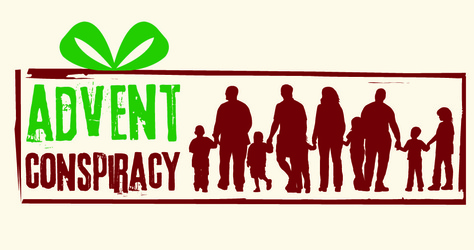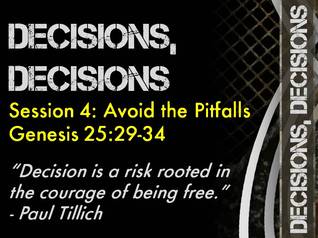This weekend we're starting a combined youth/college-age Bible Study based on the book and resources provided by the awesome people at Advent Conspiracy (click the name for their website!). I discovered AC several years ago and absolutely love the message. They also introduced me to Living Water International, a cause and people that I love. Check out the links above for more info. I'm looking forward to our study with our students at FBC!
This weekend I'm teaching students on the question "Can we know that God exists?" Tough topic, to be sure! In my preparation I sat down today and watched the pilot for the Discovery Channel's new show "Curiosity" featuring Stephen Hawking answering a similar question. Of course, Hawking's final thesis was that no, God does not exist. Though I think the guy is INSANELY brilliant, I could go on and on about why I think his logic on this is flawed (check out my Facebook statuses from earlier today!). But more importantly than that, I was reminded how important it is for us in YM to help our students navigate through some of the conflicting ideas that are out there regarding the existence of God and our ability to know Him. I know it can be intimidating for the average youth minister to teach or lead discussions on this topic. But take heart! There are lots of great resources out there for you. One of my new favorites that I led a group of middle school, high school, and college students through early this year is called True U: Does God Exist. This is a fantastic video-based study that our students absolutely loved! WARNING - some of the information can go a little over a middle schooler's (or a youth pastor's!) head, but I told my students to not worry about the information as much as the ideas. Go for the big picture stuff, so to speak. Check out the trailer below for True U and click right here to check out the website. This is really important stuff - ask your students what conflicting worldviews they face when it comes to the existence of God, and then help them strengthen their faith by talking about and teaching on those issues!
Last night in youth group we had a conversation about the power of our words. Our primary text was Eph. 4:29. I love the way The Message Bible says it: "Watch the way you talk. Let nothing foul or dirty come out of your mouth. Say only what helps, each word a gift."To illustrate how powerful our words can be, I cut a life-size paper man out of butcher paper before we began and had him laying in the center of the our meeting space (as a fun thing before we started, I had markers out so that students could draw on him and give him some "personality"!). After an opening game, we stood in a circle around the paper person (Roger, as he came to be called) and each student and adult leader took turns walking up to Roger, hurling an insult or some hurtful words at him, and then ripping off a small piece of him. It was super fun, and the students got really... creative with their insults (ROGER! YOU'RE SO TWO-DIMENSIONAL! WHY CAN'T YOU STAND UP FOR YOURSELF???) and even some of our shyer youth got in to the activity. When Roger was sufficiently shredded by our insults and negative words, I asked everyone to lay their pieces of paper back in the middle of the circle. We stood there for a second, then I said four simple words: "Put him back together." Of course, they were like YEAH RIGHT! Some actually attempted to match up the pieces and put poor old Roger back together, but it was too late. Our words had damaged him irreparably. Do I even need to explain the point? Our words can really hurt someone, and it's a lot easier to tear a person or a relationship apart than it is to put it back together. This led in to some great discussion about the power of words and our responsibility as followers of Jesus to always be building others up, NEVER tearing them down. Try it! - Tim B. PS - I can't take credit for this idea. Big props to Mike Hammer for the basis of this exercise! Check out his site here. Thanks Mike!
Our Christmas teaching series in YM this year is called "Grinches". We're looking at four different things that "steal" the true meaning of Christmas way from us. Yesterday we tackled Grinch #1 - materialism.
Here's a quick outline of where we went during the study:
- Series intro.
- What is materialism?
- How can we tell if we are materialistic?
- What does the Bible say about materialism?
- Read Matthew 6:19-21.
- What is the problem with setting your heart on "stuff"? (It is temporary.)
- What are treasures in Heaven?
- Why should we focus our hearts on Heavenly treasures instead of earthly ones? (HT's are permanent.)
- Where are our hearts focused this Christmas?
- Small group discussion.
Great kick-off to the series - excited about this one! Next up is selfishness.
- Tim B.
This weekend I'm teaching part 4 of our Bible Study series on making wise decisions. I've really enjoyed this study out of Lifeway's Known curriculum (check it out at www.lifeway.com/known).
We're reading Genesis 25:29-34 - the story of Esau trading his birthright to Jacob for a bowl of soup - and pulling out some mistakes Esau made in his decision making process and applying them to our lives. Here is an overview/summary of the study:
Title: Decisions: Avoid the Pitfalls
Big Question: How can I keep from making bad decisions?
The Answer: Avoid some of the common pitfalls that lead to bad decisions.
Scripture: Genesis 25:29-34, the story of Esau trading away his birthright.
Quick Outline:
1. Take care of yourself physically. (Esau made a huge decision when he was tired - big mistake!)
2. Don't make big decisions impulsively. (Esau made this decision in a matter of minutes. Yikes!)
3. Don't make a BIG deal out of a little deal. (Esau traded his birthright away because he was hungry. HUNGRY.)
4. Consider the cost. (Esau did not really consider the cost of his decision.)
- Tim B.
Yesterday in Youth Bible Study I taught on "Death and Dying". At first glance this sounds like a depressing topic! However, as we got in to the Word and discovered a Biblical perspective on death and dying we quickly learned that hope is around every corner and in every word of Scripture.
Here's a recap of the main points:
1. Contrary to popular belief or the ideas represented in the theme song to the Lion King ("The Circle of Life"), death is NOT a "natural" part of life. In fact, death was not a part of God's original plan, nor will it be a part of His final plan. Death is a consequence of sin and the Fall, and understanding that truth makes the pain we feel when confronted with death make far more sense. See 1 Cor. 15:21-22, Romans 5:12, Romans 6:23.
2. Again, contrary to what pop culture thinks is "in" right now regarding the afterlife, when we die we don't go to purgatory or limbo, we don't become ghosts and wander the earth, we're not annihilated, reincarnated, or anything like that. When we die, we go straight to God and face judgement. At that point, considering we're all sinners before God, it's a pretty good idea to have a relationship with Jesus, as He will claim you as His own! See Heb. 9:27, Rom. 3:23, John 3:16
3. As Christians, it is okay for us to experience the full range of emotions God gave us and mourn for loved ones - Jesus did - as long as we maintain our Biblical perspective on death and dying and profess faithfully the hope we have over death in Jesus. See John 11:35.
There may be some things that seem surprising to you when you begin to understand a Biblical perspective on death and dying. What doesn't sit well with you? What suddenly makes all the sense in the world? What lingering questions do you still have? I'd love to hear your thoughts!
This is adapted from a Bible Study I recently taught middle and high school students on Matthew 6:9-13 - The Lord's Prayer.
You should pray like this: “Our Father in heaven, Your name be honored as holy. Your kingdom come. Your will be done on earth as it is in heaven. Give us today our daily bread. And forgive us our debts, as we also have forgiven our debtors. And do not bring us into temptation, but deliver us from the evil one. For Yours is the kingdom and the power and the glory forever. Amen.” - Matthew 6:9-13 (HCSB)
1: Prayer reintroduces us to God.
“Our Father in heaven, Your name be honored as holy.”
When we pray like Jesus taught us to it reminds us of Who God is. When we direct our thoughts and affections toward Him in worship and prayer, we are introduced anew to the only One who is worthy of receiving such attentions. Our tendency to forget Who He is from moment to moment (evident in our lives through doubt, worry, sin, and inaction) necessitates our reintroduction to “our Father in heaven” Whose very Name is to “be honored as holy.” Prayer puts us into His presence, awakening us again to the reality of God’s true identity as Creator, Sustainer, Almighty, our Father, the Holy One.
2: Prayer realigns our priorities.
“Your kingdom come. Your will be done on earth as it is in heaven.”
If we follow Jesus’ model of prayer it means that we assent to God’s Kingdom and His will having supreme priority in our lives. It is impossible to pray this sort of prayer and remain selfish. Maintaining a consistent prayer life that is centered on asking God for His plan and His purpose to be lived out in our lives removes any delusions we may have that this life is all about us. When we pray in earnest we are moved to work less on our little kingdoms and more on the Kingdom that is coming and is now already here.
3: Prayer reassures us of God’s providence.
“Give us today our daily bread.”
Prayers for “our daily bread” can cause one to wonder why some who pray earnestly still go hungry or without the necessities and comforts that many of us enjoy. A student of Scripture quickly realizes though that the bread that sustains is the body and blood of Jesus – ultimately our communion with Him. “I am the Bread of Life,” Jesus told them. “No one who comes to Me will ever be hungry, and no one who believes in Me will ever be thirsty again.” (John 6:35) Prayer reassures us of God’s provision of His Son who is with us “always, to the end of the age.” (Matt. 28:20)
4: Prayer reemphasizes grace.
“And forgive us our debts, as we also have forgiven our debtors.”
At the center of Jesus’ redemptive relationship with mankind is His intrinsic nature of grace. One simply cannot know and have fellowship with Jesus Christ without having an experience of and an intimate knowledge of His grace. However, we quickly forget the mercies that were extended to us and thus fail to extend them to others. Praying like Jesus brings us to the recollection that we are sinful people who need forgiveness every day of our lives and have it through the grace of our Lord.
*Note that Jesus’ prayer is presumptive in that we are to have already forgiven our debtors. Having lingering conflict or relational strife in our lives is a detriment to our prayer lives and Jesus taught us that as we come to our Father in prayer it should be so under the condition that have at the very least attempted reconciliation with those who have, as some translations say, “sinned against us.” "Therefore, if you are offering your gift at the altar and there remember that your brother has something against you,leave your gift there in front of the altar. First go and be reconciled to your brother; then come and offer your gift.” – Matthew 5:23-24.
5: Prayer redirects the way we live.
“And do not bring us into temptation, but deliver us from the evil one.”
When we pray like Jesus taught us to, it helps to put our lives on a different course than the one our sinful nature or our enemy would otherwise lead us to. The heart that pleads to God to be delivered from sin and Satan – who “roams around like a roaring lion seeking whom he may devour” (1 Peter 5:8) – is one that God is faithful to redirect away from the temptations both within and outside of us. The Christian who is faithful to pray to God for deliverance from sin is the one who quickly learns that when we are faced with temptation God always provides a way out (1 Cor. 10:13).
6: Prayer recasts the lead role in the story.
“For Yours is the kingdom and the power and the glory forever.”
Finally, prayer forces us to remove the spotlight from ourselves and place it on to the One who is truly worthy of it. The most appropriate form of prayer is the kind that literally “puts us in our place”. When God’s people will “humble themselves” and pray, then God truly “hears them from Heaven” (2 Chron. 7:14). The throne in every man’s heart that is reserved to seat the King of Heaven and earth is always under threat of being taken over by “self”, but to pray as Jesus taught us continually replaces or secures the true King upon the throne. It reminds us that the story we are living in is not our own and neither are we the stars of it, but His is the glory forever!
Praise be to the God and Father of our Lord Jesus Christ, the Father of compassion and the God of all comfort, who comforts us in all our troubles, so that we can comfort those in any trouble with the comfort we ourselves have received from God. - 2 Corinthians 1:3-4
This morning I talked with our students about problems. Every teenager goes through different types of problems - the most common ones, in their opinions, were loneliness, peer pressure, relationships with the opposite sex, temptation to use drugs or alcohol, and difficulties at home and/or with their parents.
I brought up that there are two types of problems every human being faces:
- Problems that we CAN do something about. By changing a habit, behavior, or taking some kind of an action, making a difference is within our ability, albeit with the grace and strength of God to guide us.
- Problems that we can NOT do anything about. These are problems that, for whatever reason, are out of our control. Perhaps we are victims of circumstance or environment or maybe we're just stuck in the situation we're in with no "out".
Whatever type of problems we are facing - ones that are inside or outside of our control - the Bible says that God will comfort us in the midst of our storms. I encouraged our students (and would love to encourage you) to remember that God comforts us in the midst of problems for two reasons:
- To prove Himself as "the Father of compassion and the God of all comfort". To get the glory He deserves as a never-ending source of strength and peace.
- To shape and prepare us for future ministry. If we are aware of this - that God comforts us in our struggles so that we can comfort others - it makes getting through the valleys much more bearable and even gives us a sense of purpose as we walk through them.
Are there problems in your life you are asking God to help you sort through? Maybe some of this will help you. Leave a comment on this post sharing your story or how I could pray for you!
|






 RSS Feed
RSS Feed
